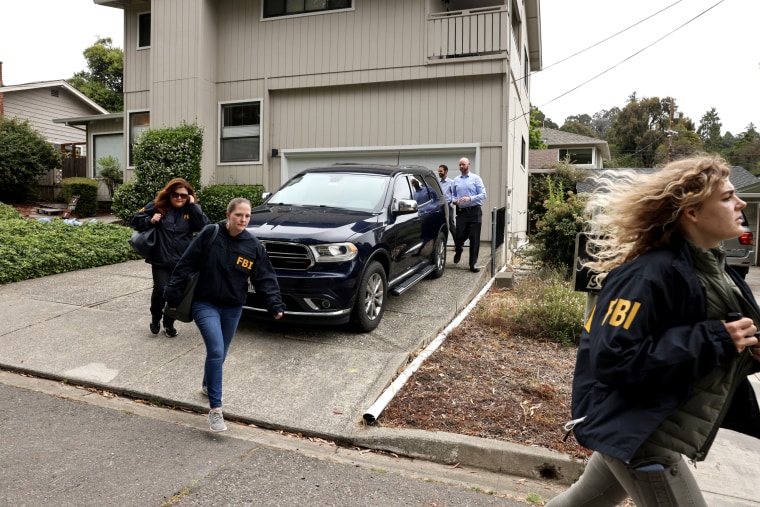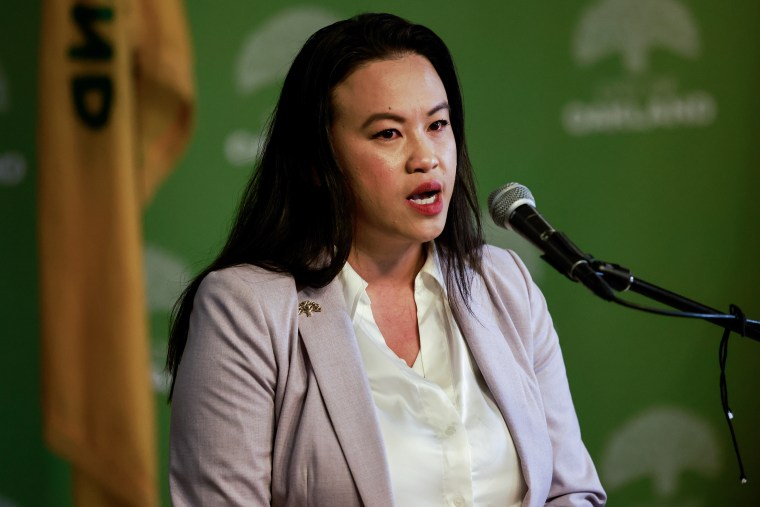Oakland, California, has a special place in the American progressive pantheon — birthplace of the Black Panthers, hotbed of labor organizing and the tenant rights’ movement, Berkeley’s bigger, edgier neighbor — so what happens in this city has ramifications far beyond the Bay Area.
And what happened here last week was huge. Voters in Oakland recalled their mayor, Sheng Thao, and their district attorney, Pamela Price (she represented Alameda County, where Oakland is by far the largest city). Both lost by about 30 percentage points, a gobsmacking margin for the city that Vice President Kamala Harris calls home.
By California law, voters will elect a new mayor and a new DA in soon-to-come special elections (until then both positions will be held by interim appointees). All indications are that they will tack right, just like the voters nationwide who made Donald Trump the first GOP presidential candidate to win the popular vote in two decades.
Voters in Oakland recalled their mayor and their district attorney by 30 percentage points, a gobsmacking margin for the city that Kamala Harris calls home.
Oakland isn’t rural Michigan or exurban Philadelphia, however — those markings aren’t supposed to exist here. And when it comes to the presidential election, Alameda County voted exactly as you would expect it to, with Harris getting 73% of the vote (she underperformed Biden, who netted 80% in 2020, but that’s another story).
Yet the very voters who soundly rejected Trump also rejected two progressive women of color who presumably would have served as bulwarks against Trumpist politics.
What gave? Well, where to start?
With the recent FBI raid of Thao’s home, I guess. The mayor insisted in an interview last month that she was not the target of the investigation that spurred the raid and the FBI has not publicly commented, though the specter of possible corruption is a huge disappointment for people who had higher hopes for the first Hmong woman to be elected to a prominent political post in the U.S.

Thao dashed those hopes almost right away. Early in her term, she fired Police Chief LeRonne Armstrong, reportedly because he wasn’t tough enough on cops accused of misconduct. Hiring a new chief took months, in what many saw as an inexcusable delay. Then, Thao somehow missed the deadline for applying for a $15 million state grant to combat retail theft — this at a time when property crime was spiking across Oakland, even as it was starting to crest in many other large cities.
The recall effort, which began in earnest earlier this year, was led by Brenda Harbin-Forte, a Black retired judge, and supported by many other members of Oakland’s robust Black community. “Look at the potholes. Look at homelessness. Look at the jobs. Look at the businesses that are leaving Oakland, and I’m mad as double ‘H-E hockey sticks,’” the pastor of one Baptist church said.
Pamela Price had made history, too, as the first Black woman to be elected as Alameda County’s chief law enforcement officer. Educated at Yale and Berkeley Law, she had run a local civil rights and employment law firm. And just like Thao, she showed that while representation matters, it can’t compensate for competence.
Crime concerns were still high when Price took office in early 2023, but in a classic misreading of the room, she started her term by releasing new, more lenient sentencing guidelines, especially for juvenile offenders. In all fairness, this had been a campaign promise, but the savvier move would have been to allay critics’ concerns before acting on supporters’ wishes.
Can you blame them for thinking: ‘This is what Democratic governance looks like?’
Then came the killing of Jasper Wu, a toddler tragically caught in a gang crossfire. Oaklanders — especially members of its large Asian American community — were stunned to learn that Price was intent on seeking “non-carceral forms of accountability” for the three men charged in the murder. That announcement came in an email “to the Chinese communities” from Price. She seems to have the appropriate level of compassion for a high-ranking post in the Trump administration.
Aware of the growing ire from Asian American Oaklanders — including Chinatown small-business owners tired of incessant burglaries — Price decided to hold a ceremony announcing her “Chinese name.” Yes, really. The best thing that can be said for this event is that it was canceled.
Oakland is blessed with astonishing natural beauty (the bay, the hills), a rich legacy of Black culture, first-rate restaurants, a plethora of breweries and some pretty decent pizza for the West Coast. But its population has been dropping steadily since 2020. And with the departure of the Oakland Raiders of the NFL (to Las Vegas), the Golden State Warriors of the NBA (to San Francisco) and the Oakland A’s of the MLB (also Vegas), the city is left without a professional sports team.
You can’t blame Thao and Price for the decisions of greedy franchise owners, but you can charge them with doing nothing to instill confidence in how Oakland was governed. As the recalls gathered force, one playing off the other, they grew combative, whereas a smarter politician would have been conciliatory.

“Until we address the primary predator — the white supremacy that creates criminality — we will always have secondary predators, because their primary needs haven’t been met,” Carroll Fife, a local activist who supported the “defund the police” movement, explained in 2021. Fife’s sentiment wasn’t shared by many of the recall supporters, who were local Black elders who had watched their community fight its way into the middle class. They weren’t going to willfully squander those gains for the sake of placating progressive ideology.
Progressive mayors, legislators and prosecutors have suffered similar rebukes — or are facing fatal plunges in popular support — in Los Angeles, San Francisco, Chicago, New York and other cities. Many of them promised transformative change, only to become entangled in the realities of governing, which have never lent themselves well to ideological rigidity. And cities have suffered as a result.
Americans from what we coastal elites call “flyover country” go to Washington and see an empty downtown, storefronts shuttered and security guards in front of both chain pharmacies and high-end retail stores. They see the homeless encampments south of San Francisco’s Market Street; they grow uneasy as someone rants and raves on a Times Square subway platform. Can you blame them for thinking: “This is what Democratic governance looks like?”
Trump did better in cities this time around than in his previous two runs for the presidency. He gained ground in New York and Washington, where the increased support came from the district’s historically Black wards. Alarms should be going off in the Democratic Party’s headquarters. If Democrats can’t get cities in order, I have a feeling Republicans will gladly do the job for them.
CORRECTION (Nov. 12, 2024, 10:31 a.m. ET) A previous version of this article mischaracterized the FBI raid on Oakland Mayor Sheng Thao’s home. She has not been accused of corruption, charged with any crime or been named the target of the investigation that resulted in the raid. The article also misspelled the mayor’s last name. She is Sheng Thao, not Tao.
